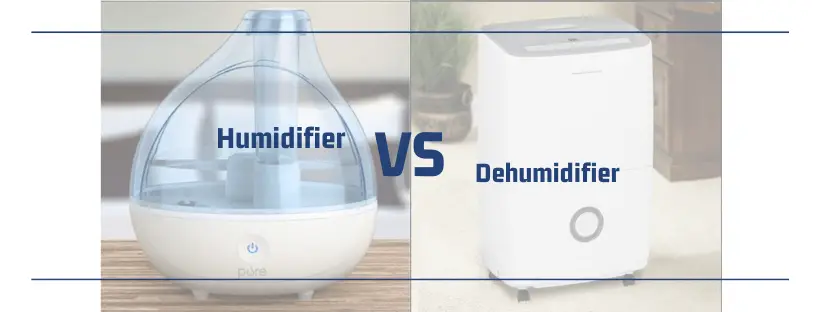
Despite sounding similar, dehumidifiers and humidifiers are direct opposites in their intended use and purpose. Many homeowners are familiar with dehumidifiers and their purpose, but some are unsure of what humidifiers do and whether they might need one.
Both have their place, and you might even find that the air quality of your home might be improved by using both at different times of the year. If you’ve always wondered what the difference is, keep reading to learn more.
The main difference between dehumidifiers and humidifiers:
Dehumidifiers reduce humidity by removing excess water and moisture from the air.
Humidifiers add moisture to the air to increase the level of overall humidity.
Its as simple as that. If the air in your home is wet, you need a dehumidifier. If the air in your home is dry, you need a humidifier.
How Can I Tell whether I Need a Dehumidifier or a Humidifier?
The only way to accurately measure humidity is through the use of a hygrometer. These devices measure humidity based on the ambient air temperature to give you an overall reading expressed as relative humidity (RH).
The ideal humidity for optimal air quality for both your health and your home’s health is 40-60%. Higher and you risk the formation of mold as damp conditions are a breeding ground for this fungus. And not just in your basement either as your main living spaces can be affected.
Lower and you might find the air dry and uncomfortable to breath. You may also find that your skin feels dry to the touch and flaky. Certain allergens also spread far more easily in low humidity environments.
Even if you don’t own a hygrometer, you might be aware that the quality of indoor air is poor which may prompt you into buying one of these appliances.
Why Would I Need Both?
Because the humidity content of the atmosphere changes throughout the year, depending on season.
Summer is usually very ‘wet’ with a high moisture content in the air. This is why states such as Florida and Louisiana are often said to feel muggy (excessively humid) in summer.
If you don’t have air conditioning, you will more than likely need a good dehumidifier to feel comfortable.
In winter, the air is often drier as cold air holds less moisture. You will also heat your home in winter which will dry the air further. This can become an issue if you have a respiratory health condition such as asthma, a recurrent cough or sinus issues. Airborne viruses also spread much easier during winter due to drier air.
This is why you’re most likely to need a humidifier over the cold winter months.
Your experiences will vary based on your local climate, but this rule remains the same across the country whether you live in a hot or cold climate.

Humidifiers Vs Dehumidifiers
The humidifier works by adding water to the air and circulating it around the room. This is done by blowing air across a wet wick to create steam or vapour. The more advanced the humidifier, the more control you will have over the environment.
Most humidifiers feature warm or cold moisturizing settings which make them ideal for periods when the cold night air replaces the warm air present during the day. The best thing about them is that you can leave them on with low running costs and minimal maintenance.
You should try a humidifier if you suffer from a sore throat and other respiratory issues or dry skin. It will make hot and dry weather more comfortable and work to relieve you of your health problems.
Dehumidifiers remove excess water from the air and return dry recycled air to lower the overall humidity in a room. Just as very low humidity is problematic, excessively humid environments usually create health concerns such as allergies and lung issues.
Mold thrives in damp environments and can easily contaminate living spaces and spread undetected. The use of a dehumidifier is the quickest and easiest way to reduce mold growth and improve the internal air quality of your home. These devices are also low maintenance and usually only require that the filter is changed monthly.
Final Verdict
No matter where you live, you too can benefit from the use of both humidifiers and dehumidifiers. Both appliances work to create better living environments, both from a health point of view and to ensure the structure of your home remains in good condition and free from timber rot and decay.
You can learn more about how dehumidifiers work as well as which ones to buy through reading other articles on Letsremovemold.com
